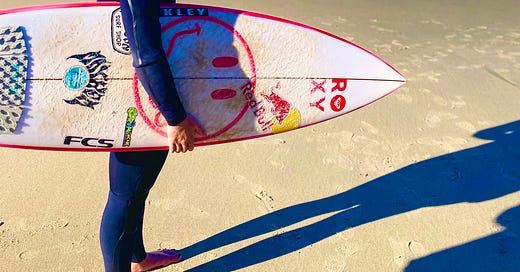Bleed, Sweat, Cry, but also Dance
One thing about winning gold I don't hear a lot about but think about a lot.
When I think back to meeting Caroline Marks, the first thing I remember striking me was how much she laughed. Everything was sick and gnarly and radical and all of it was said with a big, open-mouth, eyes-squintin’ smile. It’s easy to be that way when you’re winning and she had just won the world title a few months before my visit to her adopted hometown of San Clemente, California. She also just won Olympic gold this week so she’s smiling even more now, somehow. But before winning the world title last fall and in the year or two even before that, she’d lost all of that, forgotten how to feel that way, forgotten how to be that way. She had to remember before she could win again.
What plays best for sports fans and sponsors and coaches and people who cut them their paychecks is the serious ways great athletes do combat with the suck. Training hard, cold plunges, hot saunas, more training hard, blood and sweat and tears. Hell, my opening scene for the Sports Illustrated profile I wrote …
Keep reading with a 7-day free trial
Subscribe to Brandon Sneed to keep reading this post and get 7 days of free access to the full post archives.


